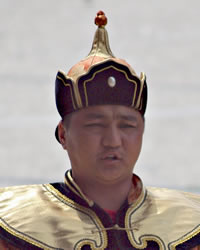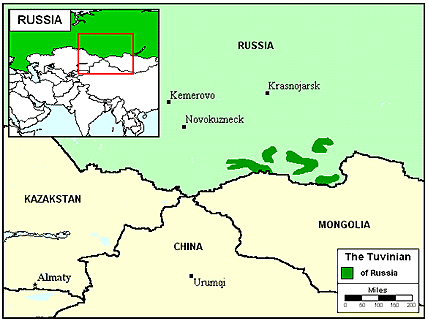Most Tuvan people live in Russia, and smaller communities can also be found in Mongolia and China. They inhabit the Tuvinian Autonomous Republic, which is located near the Mongolian border. They speak a Turkic language called Tuvin.
Tuvans live in a harsh mountainous region that has an intense climate. The summers are hot and dry with temperatures reaching 110 degrees Fahrenheit. The winters are bitterly cold with temperatures dropping to -78 degrees Fahrenheit. Still, this region has up to 300 sunny days a year, and the extremely dry air helps people to withstand the cold winters and the hot summers.
Formerly, the Tuvinian Republic was under Mongol rule. However, in 1911, it became independent "Tuva," under strong Soviet influence. In 1944, Tuva was integrated into the Soviet Union. Although the USSR dissolved in 1991, the territory remained part of Russia.
Most Tuvans raise livestock for a living. They also hunt and do a limited amount of farming. Oats, barley, wheat, and millet are the principal crops raised.
Many Tuvans live as nomadic shepherds, migrating seasonally with their herds. Those who inhabit the plains traditionally live in large felt tents called yurts. Those in Russia's Siberia usually live in round tents made from bark.
The Tuvan diet primarily consists of meat (mutton, beef, horse, goat, camel, reindeer, and wild game), fish, roots, cedar nuts, and dairy products. The Tuvans enjoy drinking airag (fermented mare's milk) on special occasions.
The main industrial activity in the Tuvinian Republic is mining, especially for asbestos, cobalt, coal, gold and uranium. Other industries include processing food, crafting leather or wood items and manufacturing building materials.
In times past, Tuvan marriages were arranged by the parents, and couples married when they reached the age of 12 or 13. Today, the minimum age for marriage is 18, and parental consent is no longer necessary. A young bride formerly lived with the husband's family, but now the couple's home is determined by their economic conditions. Divorce is common among the Tuvans, and abortion is often used as a form of birth control.
The Tuvan culture is noted for its epic poetry. Tuvans love music and play more than fifty different musical instruments. Traveling ensembles often perform outdoors.
Tuvan were traditionally Shamanists (a belief in an unseen world of gods, demons, and ancestral spirits) and Tibetan Buddhists.
Tibetan Buddhism was first embraced by the Tuvans in the 1700s. In the 1930s, the Soviets destroyed nearly all of the Buddhist monasteries, and all the monks were dispersed; some were even shot. Recently, however, a Buddhist community was officially registered in the Tuvinian Republic, and efforts are underway to rebuild a great monastery.
The influence of Shamanism is still obvious among Tuvans. They hold ceremonies on the seventh and forty-ninth days after someone's death. The soul is believed to remain in the body of the deceased for seven days, then depart for the "kingdom of the dead," reaching its ultimate destination on the forty-ninth day.
Tuvans believe that all natural elements contain spirits that must be appeased with offerings. The people are dependent on shamans (medicine men) to cure the sick by magic and communicate with the spirits.
Until Tuva become a part of Russia, very few of the men and none of the women could read. They still have educational needs.
Ask the Lord to call people who are willing to share Christ with the Tuvans.
Ask God to use Tuvan believers to share the love of Jesus with their own people.
Pray that Christian radio and television broadcasts will be made available to the Tuvans.
Ask the Lord to raise up strong local churches among Tuvans that will plant more churches.
Scripture Prayers for the Tuvan in Russia.
Bethany World Prayer Center / GAAPNet
| Profile Source: Joshua Project |












